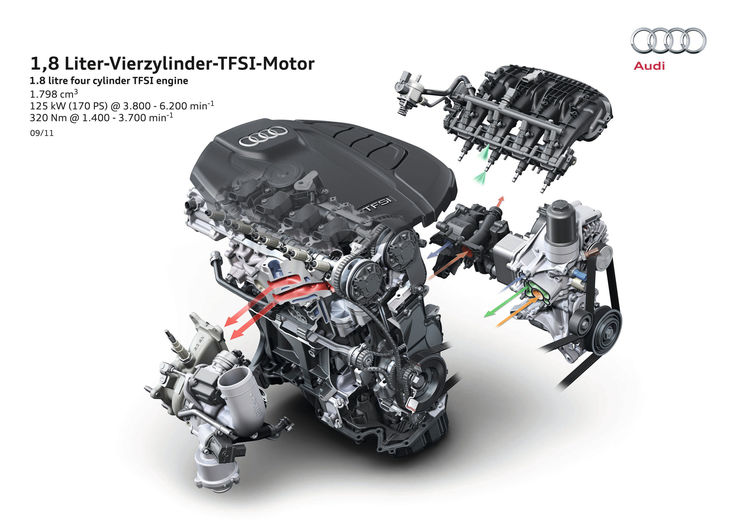The acronym TFSI is used on many Audi petrol cars and stands for “Turbocharged Fuel Stratified Injection”. If you have already read our post about the VW TSI engine, you will know that this is a new generation engine that incorporates a large number of mechanical and technological advances.
In Audi’s case, TFSI engines were introduced in 2004, specifically in the A3 Sportback Quattro. The first generation TFSI engines were 2.0-litre four-cylinder engines with an output of 200 hp @ 5100-6000 rpm and 280 Nm @ 1800-5000 rpm. That was approximately 100 horsepower per litre, quite an achievement for the time.
The secret to developing such a level of power lay in the use of a Gasoline Direct Injection (GDI) system, state-of-the-art turbocharging, variable valve timing, and high-output ignition coils among other advances. The resounding success of the 2004 Audi A3 2.0 TFSI Quattro led the German brand to develop further engine variants.
That’s why today there are 6-cylinder and 8-cylinder TFSI engines. If you drive an Audi A8, you should know that the 4.0-litre V8 twin-turbo engine with 450 Hp and 440 Nm in your car is from the TFSI family. That’s why it produces 100+ Hp/litre.
While TFSI engines represent a major advance in terms of fuel economy, low CO levels, and power, they have also brought some drawbacks to their users.
The Achilles heel of TFSI technology
Most of the time innovations are accompanied by new challenges to overcome. This is the case with the TFSI engines. The combination of GDI systems and turbochargers has some undesirable consequences for the engine. The most notable is carbon build-up in the valves and excessive oil consumption due to lubrication problems.
Below, we share with you a list of problems that are common to both Audi TFSI and VW TSI engines:
- Clogged fuel injectors
- Random misfires
- Excessive oil consumption
- Timing chain tensioner failure
- Ignition coil overheating
While mechanical problems are difficult to prevent, some of these situations can be kept at bay with timely maintenance. But not just any maintenance, but special maintenance aimed at GDI engines.
The solution to the TFSI engine problems.
For over 50 years TecFlow has been developing products specifically designed for vehicle maintenance. Among them, products aimed at combating the problems of engines equipped with GDI technology.
Our products serve the dual purpose of removing carbon build-up from the valves and the rest of the fuel system and keeping your engine free of contaminants. Moreover, as specialists in preventive maintenance, TecFlow products also help to keep your engine in top condition.
To achieve this goal, we have developed two lines for professional engine products.
Ceramic Lubricants. Our incredible line of ceramic-based products is the perfect solution to lessen the wear and tear caused by the lack of lubrication in the internal parts of the TFSI engine. Oour CERAMIC ENGINE PROTECTOR will protect your engine with a film of ceramic microparticles that will considerably reduce wear and protects againts contamination of the piston rings.
Fuel System Cleaners. The concentrated formula of TecFlow’s SPEED CLEANER is specially created to remove carbon build-up from valves, injectors, cylinder heads, turbo vanes, and more. Furthermore, after performing a complete service with SPEED CLEANER, you can keep your fuel system free of harmful agents thanks to our exclusive CLEAN UP 101, a fuel additive with proven effectiveness in Audi’s TFSI engines.
Audi’s TFSI engines are fantastic. The feeling of driving any model equipped with these engines is unforgettable. Whether you drive an A3 or an A8, don’t let carbon build-up dampen your driving experience. TecFlow products are designed to remove and prevent this and other contaminants to allow you to enjoy your car to the fullest.

